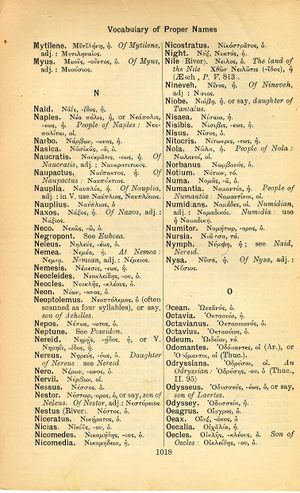Nestor
Ἄξιόν ἐστι τὸ ἀρνίον τὸ ἐσφαγμένον λαβεῖν τὴν δύναμιν καὶ τὸν πλοῦτον καὶ σοφίαν καὶ ἰσχὺν καὶ τιμὴν καὶ δόξαν καὶ εὐλογίαν → Worthy is the Lamb that was slain to receive power, and riches, and wisdom, and strength, and honour, and glory, and blessing
English > Greek (Woodhouse)
Νέστωρ, -ορος, ὁ, or say, son of Neleus.
Of Nestor, adj.: Νεστόρειος.
Latin > English (Lewis & Short)
Nestor: ŏris (Gr. acc. Nestora, Hor. C. 1, 15, 22), m., = Νέστωρ,
I a son of Neleus, and king of Pylus, famous among the heroes before Troy for his wisdom and eloquence. He is said to have lived through three generations of men: ipsi Agamemnoni, regi regum, fuit honestum, habere aliquem in consiliis capiendis Nestorem, Cic. Fam. 9, 14, 2; cf. id. Sen. 10, 31; id. Tusc. 5, 3, 7: licet eloquio fidum quoque Nestora vincat, Ov. M. 13, 63; Prop. 2, 10, 46 (3, 5, 30); cf. Hor. C. 2, 9, 13; Tib. 4, 1, 49.—Nestoris aetas, the age of Nestor, prov. for a long life, Mart. 2, 64, 3; cf. id. 7, 96, 7; 5, 58, 5 al.: vivat Pacuvius, quaeso, vel Nestora totum, i. e. a whole life of Nestor, Juv. 12, 128.—Hence,
II Nestŏrĕus, a, um, adj., of Nestor: senecta, Mart. 9, 30, 1; Stat. S. 1, 3, 110.
Latin > French (Gaffiot 2016)
Nestŏr,¹² ŏris, m. (Νέστωρ), roi de Pylos, un des héros du siège de Troie, renommé pour sa sagesse et son éloquence, qui vécut trois générations d’homme : Cic. Fam. 9, 14, 2 ; CM 31 || [fig.] vivere Nestora totum Juv. 12, 128, vivre autant que Nestor || -rĕus, a, um, de Nestor : Mart. 9, 30, 1.
Latin > German (Georges)
Nestor, oris, m. (Νέστωρ), des Neleus Sohn, König in Pylus, einer der Helden vor Troja, der, berühmt wegen seiner Klugheit u. Beredsamkeit, drei Menschenalter gelebt haben soll, Cic. de sen. 31; Tusc. 5, 7. Tibull. 4, 1, 50. Ov. met. 8, 813: griech. Akk. Nestora, Hor. carm. 1, 15, 22. Auson. epist. 16, 14: Plur. Nestores, Akk. Nestoras, angef. bei Varro LL. 10, 69. – Sprichw., Nestoris aetas od. anni = hohes Alter, Mart. 2, 64, 3; 5, 29, 5; vgl. vivat vel Nestora totum, drei Menschenalter, Iuven. 12. 128. – Dav. Nestoreus (Νεστόρεος), a, um, nestorisch, senecta, Mart. 9, 29, 1 u. 13, 117, 1. Stat. silv. 1, 3, 110: Pylos, Sen. Herc. fur. 565.

